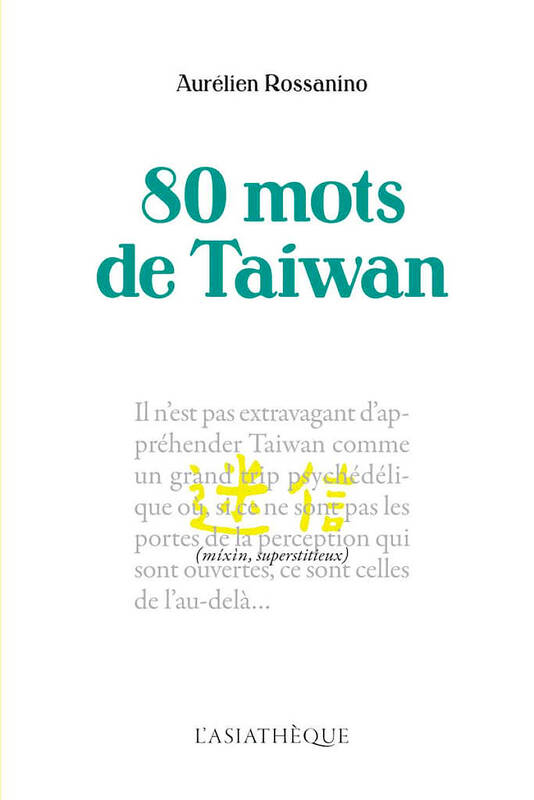A French-language book titled 80 mots de Taiwan (80 Words of Taiwan) tells the story of Taiwan through 80 of the nation’s most distinctive words, with the author praising Taiwan as a culturally diverse society where multiple languages are spoken.
Published on May 7 by L’Asiatheque, the book — written by Aurelien Rossanino, a French national living in Taiwan — introduces terms unique to contemporary Taiwan, selected from Mandarin, Hoklo (commonly known as Taiwanese), Hakka and indigenous languages.
Examples include “Taiman” (台漫), meaning Taiwanese manga, and “adju,” meaning sister in Paiwan.

Photo: Screen grab from the Overseas Community Affairs Council’s Web site
The book also explores the influence of Japanese and English on Taiwan’s vocabulary and includes terms related to its democracy, aimed at helping French readers better understand Taiwanese history.
Rossanino described the book as “more of a literary work than a dictionary,” saying it focuses on telling the stories of modern Taiwanese through the words, rather than simply defining them.
He said in a media interview that while Taiwan is gaining attention in French media, most French-language books about the country remain academic or geared toward tourists.
His goal is to present contemporary Taiwanese society through a lens that highlights its humor, modernity and “underground” culture, he said.
“My main job is to interview people and make sure their voices are heard, so I can present what Taiwanese people actually see,” he said.
As the host of a music-themed podcast and an independent journalist, Rossanino said he has met many Taiwanese artists in music, art and culture, adding that they showed him how humorous and creative Taiwanese are with language, inspiring his fascination with Taiwan’s linguistic culture.
Another major inspiration was Emily Y. Wu (吳怡慈) and other political journalists at the Taiwan-based podcast network Ghost Island Media, who encouraged him to include Taiwan’s democratic history in his work, Rossanino said.
While seeking information about Taiwan’s indigenous cultures for the book, he received an invitation from Paiwan singer Sauljaljui to visit her hand-built home deep in the mountains of Pingtung County’s Mudan Township (牡丹), he said.
The township is a historic battleground where Taiwan’s indigenous peoples fought against Japanese soldiers in 1874.
Describing the area as “a different world compared to Taipei,” Rossanino said that writing the book gave him the privilege of visiting such a historically significant place, a rare experience for someone from an ordinary village in southern France.
In the interview, he also paid tribute to French musician Arnaud Lechat, who lived in Taiwan for 30 years and played a key role in the book before he died last year.
“I hope he is satisfied with the book in heaven,” Rossanino said.
When asked about his thoughts on Taiwan, he expressed optimism about its development in infrastructure and national identity, applauding Taiwan for “heading in a more beautiful direction.”
“I want to present Taiwan in 2025 — a modern nation that keeps moving forward,” he said.

Taiwan has received more than US$70 million in royalties as of the end of last year from developing the F-16V jet as countries worldwide purchase or upgrade to this popular model, government and military officials said on Saturday. Taiwan funded the development of the F-16V jet and ended up the sole investor as other countries withdrew from the program. Now the F-16V is increasingly popular and countries must pay Taiwan a percentage in royalties when they purchase new F-16V aircraft or upgrade older F-16 models. The next five years are expected to be the peak for these royalties, with Taiwan potentially earning

STAY IN YOUR LANE: As the US and Israel attack Iran, the ministry has warned China not to overstep by including Taiwanese citizens in its evacuation orders The Ministry of Foreign Affairs (MOFA) yesterday rebuked a statement by China’s embassy in Israel that it would evacuate Taiwanese holders of Chinese travel documents from Israel amid the latter’s escalating conflict with Iran. Tensions have risen across the Middle East in the wake of US and Israeli airstrikes on Iran beginning Saturday. China subsequently issued an evacuation notice for its citizens. In a news release, the Chinese embassy in Israel said holders of “Taiwan compatriot permits (台胞證)” issued to Taiwanese nationals by Chinese authorities for travel to China — could register for evacuation to Egypt. In Taipei, the ministry yesterday said Taiwan

Taiwan is awaiting official notification from the US regarding the status of the Agreement on Reciprocal Trade (ART) after the US Supreme Court ruled US President Donald Trump's global tariffs unconstitutional. Speaking to reporters before a legislative hearing today, Premier Cho Jung-tai (卓榮泰) said that Taiwan's negotiation team remains focused on ensuring that the bilateral trade deal remains intact despite the legal challenge to Trump's tariff policy. "The US has pledged to notify its trade partners once the subsequent administrative and legal processes are finalized, and that certainly includes Taiwan," Cho said when asked about opposition parties’ doubts that the ART was

If China chose to invade Taiwan tomorrow, it would only have to sever three undersea fiber-optic cable clusters to cause a data blackout, Jason Hsu (許毓仁), a senior fellow at the Hudson Institute and former Chinese Nationalist Party (KMT) legislator, told a US security panel yesterday. In a Taiwan contingency, cable disruption would be one of the earliest preinvasion actions and the signal that escalation had begun, he said, adding that Taiwan’s current cable repair capabilities are insufficient. The US-China Economic and Security Review Commission (USCC) yesterday held a hearing on US-China Competition Under the Sea, with Hsu speaking on